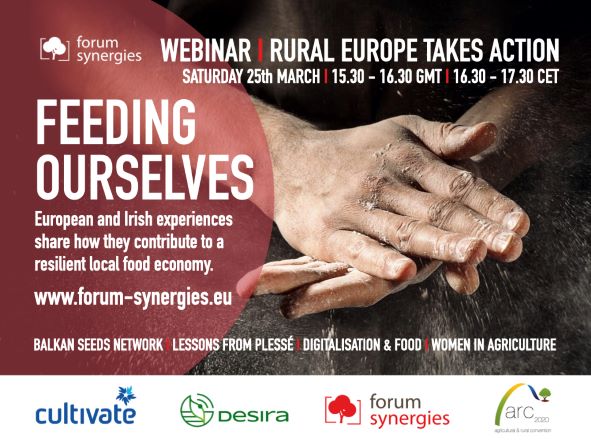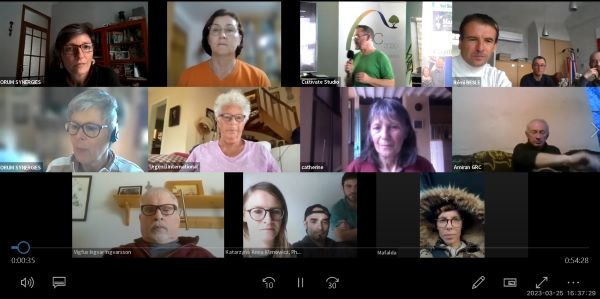
Webinar "Connecting with Europe - Rural Europe Takes Action" during Feeding Ourselves 2023
“Feeding Ourselves 2023 – Another Rural is Possible!” took place on 25th & 26th March at Cloughjordhan ecovillage, with Cultivate among organisers.
This gathering was designed to facilitate community learning and movement building. It was an opportunity to celebrate and connect to nature, food and community, to learn more about practicing food sovereignty, seed sovereignty, agroecology, and community-supported local food systems.
(Here is the full programme of FO2023 ; you can also read more about the issues of the event on ARC2020 website )
A window to Europe was opened during the webinar "Connecting with Europe - Rural Europe Takes Action" organised in partnership with Forum Synergies on Saturday 25th. This event was in continuity with previous activities co-organised on the Food topic with Cultivate and Arc 2020 (Webinar: Growing food resilience in Covid-19 times-New tools and approaches for agroecology; "Local food-Reimagining Regional Responses"). And it was an opportunity to present some initiatives from the book "Rural Europe Takes Action - No more business as usual" and highlight how they contribute to the local food economy.
Simone Matouch - coordinator of Forum Synergies – reminded that the idea behind the book is that a radical change is needed. The book brought together projects with existing resilient and innovative practices. The idea is to maintain contact and synergies between these initiatives across borders and generations.
Ivana Petrović, from the Balkan Seeds Network, introduced this network of scientists and seed savers’ organisations that are tapping into the rich biodiversity and agricultural heritage of South Eastern Europe to stimulate resilient food systems and transnational cooperation. Created in 2020, the network consists of sixteen players from 9 countries, a mix of civil society associations, NGOs, scientific and academic institutions, farmers and seed savers in general. The Balkans are rich in biodiversity and agrobiodiversity; they still preserve traditional knowledge and cuisine, which are threatened by rural depopulation. Besides, the Balkan countries struggle to develop frameworks for the conservation and sustainable use of plant genetic resources. These challenges motivated the creation of the network and its activities related to exchange information and materials; cooperate on research programs; exchange training methods to save seeds ex-situ and on-farm and lobby for seeds and farmers’ rights to safeguard traditional practices that support agrobiodiversity.
We moved then to the West of France, where the municipality of Plessé decided to take agricultural affairs into their own handsin order to maintain the village farming activity. Rémi Besle, a farmer and elected representative explained the idea behind the "local" CAP - Local Agriculture and Food Policy of this small town of 5,500 inhabitants. The objectives are to support farmers, to value and promote their work and to preserve local (natural) resources. Above all, the PAAC is about discussing agriculture from a local perspective, when the competences are often at regional or national level. 6 different themes have been developed:
1. Spread a positive communication about the town’s agriculture: a dynamic network is needed to welcome new entrants and ensure farms maintenance.
2. Support reliable, diverse (and sustainable) agriculture in the town: the idea is to ensure farmers livelihood but also the maximum food diversity in the town. Many are dairy and cows farms and more market gardening, vegetables, sheep and forests are needed, etc.
3. Foster short supply chains: the town has decided to set up a shop for local products and a platform to manage production and supply the local canteen(s) with local farmers products (80%).
4. Maintain farms - 1 farmer leaves, 1 takes his place: over the last 3 years, they succeed to have 25 arrivals for 25 departures! There 92 farms with 133 farmers, 36% of whom are over 55 years old, so farm transmission is a real challenge. Fortunately young farmers group helps attracting other farmers.
5. Protect natural resources: the flagship project is the implementation of a survey on hedges, their maintenance and the prohibition of their removal.
6. Preserve farmland: the town limits constructions for normal land and is vigilant about land purchase, to ensure that there is no agricultural land speculation.
Remi illustrated their work on land speculation with a concrete example: in France, the SAFER agency has right of preemption on farmland. Thus, the municipality has access to all sales of farmland on its territory and can prevent the purchase of land at unauthorized prices. The week before the webinar, they preempted the purchase of 25 ha, which was initially sold at € 3000 / ha, to sell it at € 2000 ( the average price in Plessé). Fighting speculation on farm prices facilitates the installation of young farmers.
But what about the local people? “We don’t talk about participative democracy anymore in Plesse, rather participation in democracy” was Remi’s answer to a question related to citizens participation. However he acknowledged that a lot of work needs to be done to facilitate participation democracy and they probably need more animators to reactivate the population’s engagement.
Then, Mel White presented an Irish initiative with an international component: Cloughjordan Food Hub. Established in Australia in 2012, Open Food Network (OFN) is a user-owned open-source platform now operating in 20 countries. It aims to build a public infrastructure for selling and distributing local food. Direct selling is done individually or through a hub. North Tipperary Online Farmers Market has about 20 producers, including Community Supported Agriculture (CSA), local cheese, and bread crafts. The idea is to feed themselves as much as possible within the local area. It allows a fair price for producers (no extraction of profits to shareholders) and reduces waste (only what is sold is harvested). In this area, the online market works better than a farmers market, which may not have enough sales to be viable. It runs on a two-week cycle and saves time to producers who do not have to push themselves out to the public if they do not want to. The food hub is a physical space where the market is located. It also has a cafe one day a week and participates in local sustainable food awareness events. The hub is looking at other areas to bring in, such as preserving surplus vegetables, adding value to gluts, and selling them. The Food hub is part of the European project DESIRA and is reporting all the benefits and costs of the initiative to determine how it could be replicated and scaled.
And we finished the webinar talking about Woman in Agriculture. Talamh Beo, the Irish Land Workers Alliance has been envisioning what gender equality looks like in agriculture and highlighting how inequality prevents women bringing their perspective and experience to the discussion, design, decision and implementation of all things related to food, farming and rural living. Janet, an organic market gardener based in the south east of Ireland explained her journey, coming came back to the land after working in pharmaceuticals. She discovered the organic market gardening movement in Ireland and thanks to her partner being gifted land by her uncle, they established business on 3 acres. She felt and still feels motivation to work as an ambassador for nature, stressing that working on their parcel of land for the last few years is rewarding. As she started to wonder how to influence further changes, she felt aligned with Talamh beo principles such as food sovereignty, protection of natural resources etc. And specially with the gender equality balance of the organisation: it is based on a 50:50 balance across all the working groups and means there is a strong representation of women. In the frame of the Soil biodiversity EIP, they specially approached gender mainstreaming in agriculture. A survey was conducted to identify the issues women face in agriculture: in Ireland 13% of farms are owned by women whereas 25% of the workforce is female. “It is related to a deeply held cultural bias, part of our patriarchal structure”, she stressed. Organisations like Talamh beo can put emphasis on female participation, with both men and women involvement to overcome these obstacles.
Talamh Beo is also part of CAP strategy meetings and has been successful in reducing the gap of grant aids since 60 % is for female farmers. In addition, they have female only knowledge transfer groups as a space to discuss for women. To conclude, Janet mentioned that the issues women face in agriculture are related to the loss of connection with nature and that bringing more female voices in on the importance of care for instance can help to address broader issues. Her final words where “gender equality is not just a human right but is a necessity to address social and environmental issues we are facing”.
Louise Kelleher from ARC2020, closed the webinar explaining that the idea of the book and such a webinar is to show the action is already happening, that policymakers are behind and need to catch up. She invited participants to have a look to the “Unwritten regulation CAP alternative” – a provocative proposal which invites to start a discussion, and that comments and suggestions were welcome.
Watch the recording here:
Learn more about the European experiences on the digital version of the book "Rural Europe Takes Action - No more business as usual" ; powerpoint presentations are also available
- p38 “Creative municipalities – Bringing people into agri-food policies” (Plessé Municipality) - powerpoint presentation
- p108 “Seeds of collaboration (Balkan Seeds Network) - powerpoint presentation
- p117 “The Open Food Hub at Cloughjordan”
Marina GUEDON


